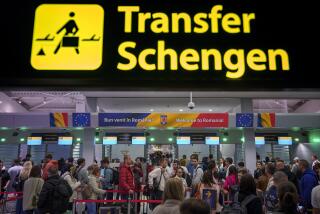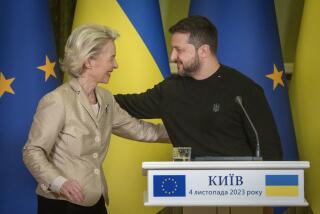Croatia poised to become 28th member of EU
- Share via
LONDON — A nation forged from the most recent war on European soil is set to become the latest member of the European Union on Monday, possibly the last time for several years that the beleaguered trading bloc admits a new entrant.
Croatia’s accession as the EU’s 28th member state caps a rigorous application process begun about a decade ago and is, in effect, a reward for the country’s efforts to mold itself into a stable democracy out of the ashes of the Balkan wars of the 1990s. An estimated 100,000 people died in the brutal ethnic conflicts that stemmed from the breakup of the former Yugoslavia.
Croatian President Ivo Josipovic has called EU membership “both a hard-earned success and the beginning of a challenge” for his country, whose consumers will enjoy cheaper access to goods and services from other EU nations but whose companies will struggle to compete after the removal of duties and other trade barriers.
The nation of 4.5 million people is in the midst of a prolonged recession, with a high unemployment rate, especially among the young.
Also, some analysts say public enthusiasm for the EU in Croatia has waned amid Europe’s debt crisis and Brussels’ demands on the government in Zagreb to go after Croatians it suspects of committing atrocities during the Balkan wars.
Still, many in Croatia view EU membership as a potent seal of international acceptance and approval. The country is the first of the main actors in the Balkan conflict to qualify, well ahead of Serbia, which was not granted candidate status until 2012, after it had arrested war crimes suspects and pledged to resolve its feud with Kosovo. Serbia’s negotiations with European officials are expected to begin by January and to last at least a few years.
“Joining the EU has been the No. 1 priority of every country in the [Balkan] region since 2000. So finally doing it … matters a lot,” said Eric Gordy, an expert on southeast Europe at University College London. “It’s a very, very encouraging sign for the other countries.”
For the EU — whose president, Herman Van Rompuy, on Friday called Croatia’s entry “a historic moment for the Balkans and for Europe as a whole” — welcoming an eager new member is cause for some celebration and relief of its own.
The euro debt crisis and heavy austerity have hammered economies across the continent and sown disenchantment with the project of greater European integration. Germany, the EU’s unofficial leader, is regularly the target of its neighbors’ ire. Croatia’s accession and the aspirations of other Balkan nations to follow suit allow Brussels to assert that the EU remains relevant, a catalyst for peace and democratic reform.
In addition to Serbia, Montenegro is hoping to join by the beginning of the next decade, and on Friday, EU officials announced that they would seek closer ties with Kosovo.
To be eligible, a country must have a market economy and demonstrate respect for democratic institutions, human rights and the rule of law. The application process typically takes years as candidates seek to enact laws in line with EU demands.
Great fanfare greeted the entrance of a raft of Eastern European nations in 2004, which was seen as closing the book on the area’s Soviet-dominated past. The pace of expansion then slowed, partly because the EU began stiffening its eligibility requirements, and Croatia’s is likely to be the last for several years.
Its negotiations on membership stalled for a time over demands that the government do more to hunt down a fugitive military leader, Gen. Ante Gotovina, who was suspected of committing war crimes against Serbs. Gotovina was eventually arrested in the Canary Islands, tried at The Hague and sent to prison, which angered many of his compatriots. When international judges later threw out his conviction, he returned to a hero’s welcome in Croatia.
Likewise, the opening of talks between Serbia and the EU was delayed until major figures in the Balkan wars were arrested, including Ratko Mladic, the Serbian military commander accused of allowing the massacre of 8,000 Muslim men and boys in the town of Srebrenica, one of the most notorious incidents in modern European history. Mladic was captured in 2011.
Besides the boost in status, EU membership should bring tangible benefits to Zagreb in the form of subsidies for infrastructure and other development projects. But Croatian industries will have a tough time competing in Europe’s common market, and the country’s flagging economy remains heavily reliant on the tourists who flock to its beautiful and extensive coastline.
“The calculation is that even with Croatia in economic crisis, and even with the EU in economic crisis, having access to the market and the funds is a benefit to them,” Gordy said. “It’s still a bigger advantage to be part of the EU than not to be.”
More to Read
Sign up for Essential California
The most important California stories and recommendations in your inbox every morning.
You may occasionally receive promotional content from the Los Angeles Times.













